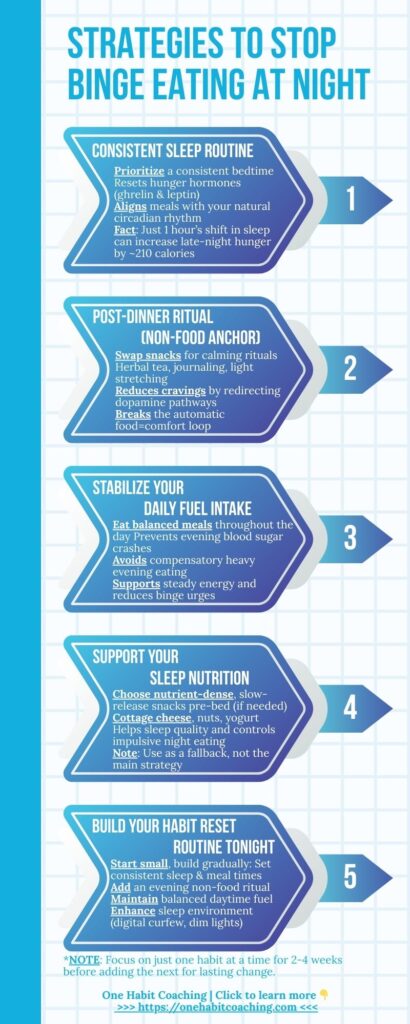You’ve had a perfect day—meals balanced, snacks avoided, discipline on point. But then 9 PM hits… and suddenly you're standing in the kitchen, devouring snacks you don’t even want.
You’re not broken. You're just stuck in a biological-emotional loop that makes it nearly impossible to resist. In this guide, you’ll learn how to stop binge eating at night by understanding why it happens and using habit-based strategies—not willpower—to break free.
Why You Binge Eat at Night (and What Science Says)
1. Hormonal Imbalances from Poor Sleep
Poor sleep disrupts hunger hormones—ghrelin (stimulates hunger) rises, while leptin (signals fullness) drops. One study showed a single night of sleep deprivation lowered leptin and increased ghrelin, making you more likely to binge eat in the evening. PubMed
This isn’t just hormone noise—it’s rooted in our biology, pushing us toward quick-energy food because our regulation systems are out of balance.
2. Circadian Misalignment Is a Hidden Trigger
When your internal clock is out of sync, your hunger cues shift. Research points to night eating patterns driven by delayed signals for melatonin and leptin, particularly among people with disrupted circadian rhythms.
SpringerLink
Frontiers
In effect, binge eating becomes an internal response to a confused biological ringer—especially painful late at night when control feels lowest.
3. Emotional Eating and Nighttime Cravings
Emotional eating fuels higher rates of Night Eating Syndrome (NES), a condition marked by repeated nighttime eating tied to poor sleep. Emotional eaters are over six times more likely to have NES.
SpringerLink
Sleep Foundation
This isn’t about guilt—it’s about how stress and emotional exhaustion trigger physical late night cravings after dark.
Simple Habit-Based Strategies to Stop Binge Eating at Night

Establish a Consistent Sleep Routine
Prioritise consistent bedtime to reset hormone balance. Even shifting meals to align with your circadian rhythm helps:
Just one hour's shift in sleep can boost hunger for late-night snacking by ~210 calories.
Better sleep means stronger executive control and reduced drive for impulse-based food.
Install a Post-Dinner Ritual (Non-Food Anchor)
Swap late-night snacking for a calming ritual—like herbal tea, light stretching, or journaling.
This leverages "urge surfing" or N-F-A (non-food activity), shown to reduce cravings when we redirect the brain's search for dopamine away from junk food.
Stabilise Your Daily Fuel Intake
Under-eating or skipping meals sets you up for an evening crash.
One study noted binge eaters often eat less during the day and compensate with heavy evening intake—and more binges.
Balanced breakfast, lunch, and dinner helps reduce late-night overeating.
Support Your Sleep Nutrition
Choosing nutrient-dense, slow-release snacks pre-bed can help if hunger sets in—like protein dense cottage cheese, nuts, or yogurt. These may aid sleep and reduce or even help you stop nighttime binge eating and impulsive nighttime eating all together
But this must be a fallback, not the main strategy.
Section 3: Build Your “Habit Reset” Routine Tonight
| Step | Habit Reset Action | Why It Works |
|---|---|---|
| 1. Set Sleep + Meal Times | Go to bed and eat consistently each night | Supports hormone balance & circadian rhythm |
| 2. Evening Ritual | Non-food activity for wind-down | Breaks the food=comfort impulse loop |
| 3. Daytime Fuel Routine | Balanced meals + snacks spaced | Prevents evening blood sugar crashes |
| 4. Sleep Enhancers | Digital curfew, dim lights, calm environment | Improves quality of rest, reduces cravings |
Start small—pick one habit tonight. Repeat for 3 weeks before adding the next. That’s enough to form lasting change.
What to Do If You Slip
- Pause. Reflect. Don’t shame. Ask: What triggered this urge? Adjust tomorrow’s plan accordingly.
- Wake-up munching? Try herbal tea or light movement instead.
- Emotional trigger? Use journaling or breathing to process, not food.
Every slip is feedback—it’s not failure. Each response builds resilience.
Ready to Break the Binge Cycle for Good?
If you’re tired of relying on willpower and quick fixes, it’s time for a shift. My Break the Binge Cycle programme gives you step-by-step habit resets, sleep strategies, and an actual plan that works.Start now with a FREE 2-week trial — no diets, no pressure, just results.
Try it Free for 2 Weeks → onehabitcoaching.com
Bibliography & Research References
- Effects of acute sleep deprivation on leptin and ghrelin — fasting leptin falls, ghrelin rises after one night lost sleep.
PubMed Wiley - Night Eating Syndrome linked to lower leptin/melatonin levels and emotional eating.
SpringerLink
Sleep Foundation - Circadian rhythms influence binge eating and evening food intake patterns.
Frontiers
Wikipedia - Inadequate sleep increases cravings due to hormone disruption (ghrelin, leptin) and reward sensitivity.
Wikipedia - Sleep timing variability (social jet lag) increases daily calorie intake.
TIME
Nutrient-rich evening snacks support sleep better than sugary ones.
The Times
